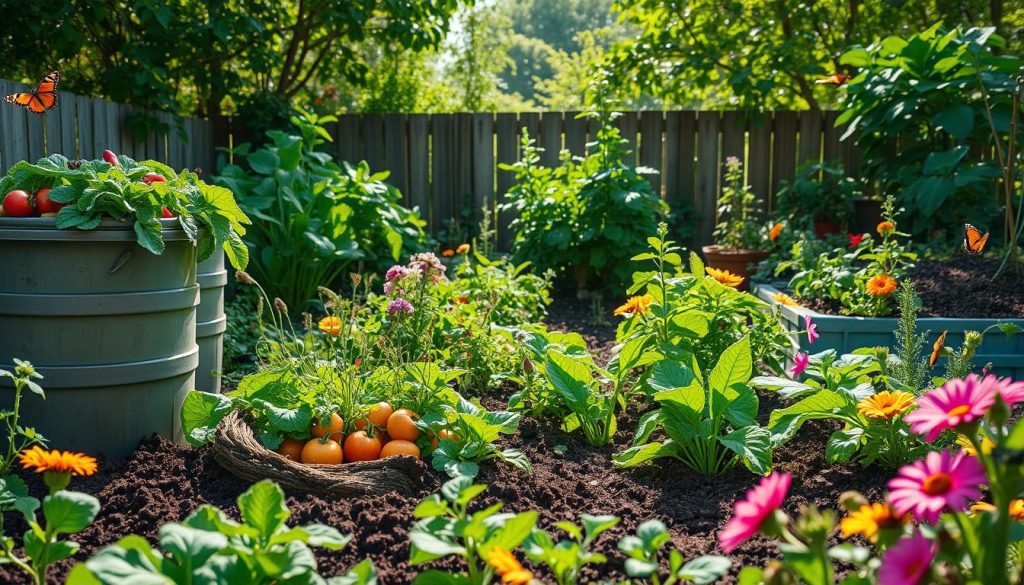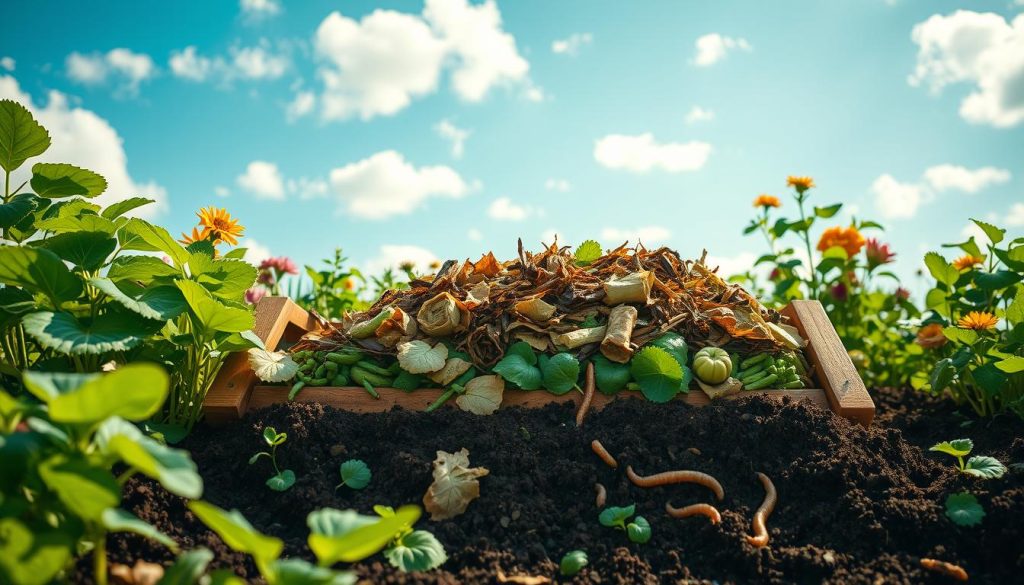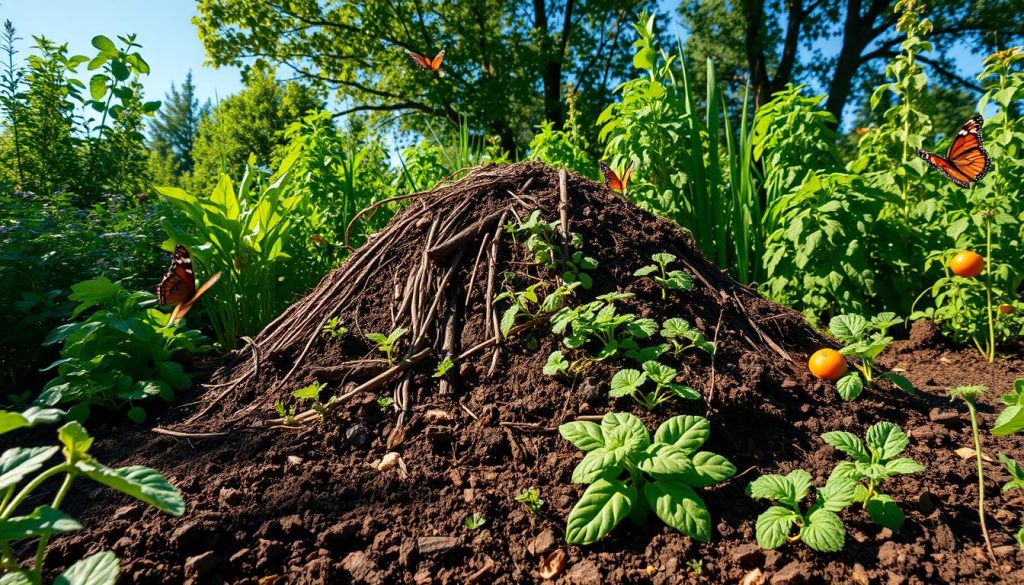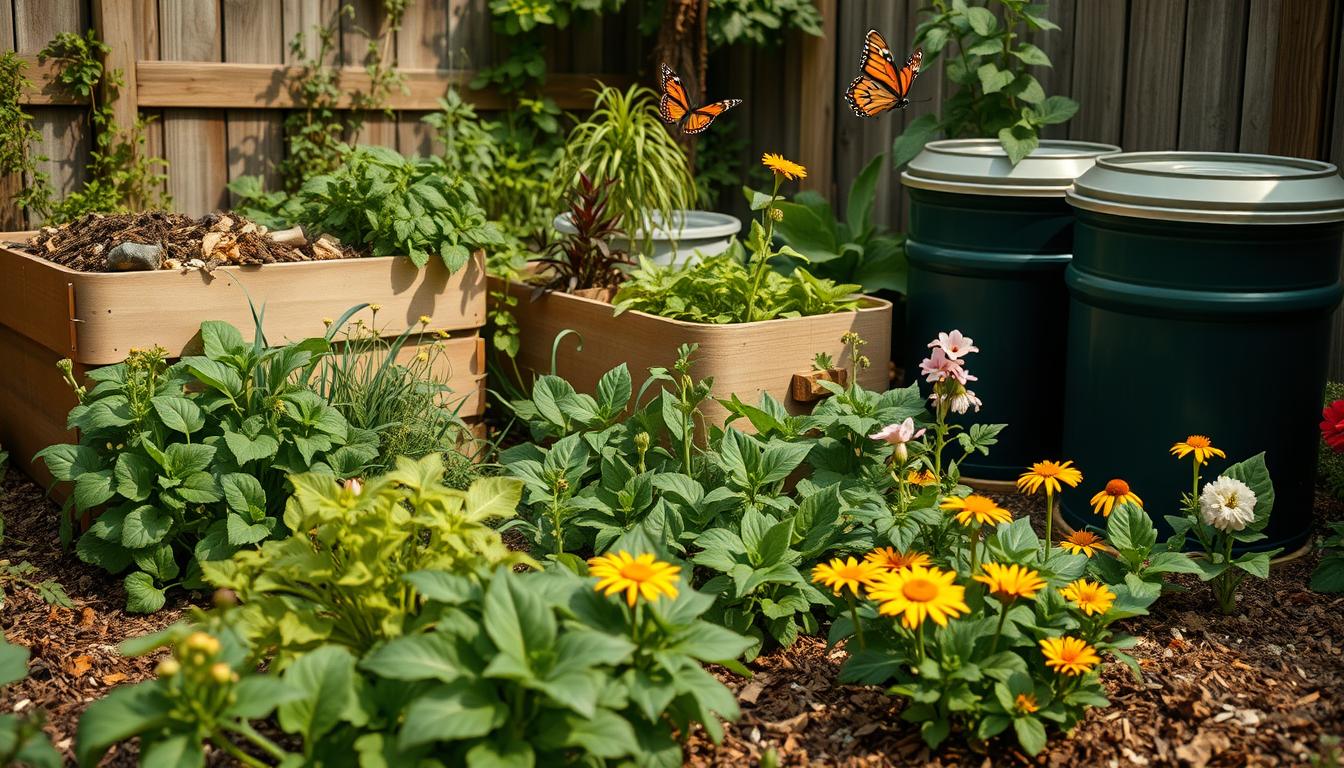I started gardening to live more sustainably and cut down on waste. It showed me how gardening can help us reduce waste in our daily lives. By using sustainable gardening practices, I cut down on waste and lived more eco-friendly.
As I got into gardening, I saw how important it is for reducing waste. It’s not just about recycling or composting. It’s about making smart choices every day. This journey has made me want to share my story and encourage others to garden to reduce waste.
My experience with gardening has shown me its positive effects on waste reduction. By adopting sustainable gardening practices, we can all live more environmentally friendly. In this article, I’ll share my story and explore how gardening can reduce waste. This includes composting, recycling, and making sustainable choices in our daily lives.
Introduction to Gardening and Waste Reduction
Starting my gardening journey made me think about how my actions affect the environment. I found out that gardening can help reduce waste and live more sustainably. Simple actions like composting can cut down landfill waste and make my soil better for plants.
Composting has many benefits, like lowering greenhouse gases and making a natural fertilizer. This made me want to learn more about reducing waste. I discovered that small changes in my daily life can make a big difference for the planet.
My Initial Thoughts on Gardening
At first, I thought gardening was just about planting and watching plants grow. But it’s so much more. It’s about creating a sustainable space, reducing waste, and supporting biodiversity. This mindset helped me turn my garden into a lush, productive space that also helps the environment.
The Concept of Waste Reduction
Waste reduction is key to living sustainably, and gardening is a big part of it. By composting and using natural materials, I cut down on landfill waste. This not only lessens my environmental impact but also makes my soil better for plants. Ways I reduced waste include:
- Composting food waste and yard trimmings
- Using natural materials like leaves and branches as mulch
- Avoiding synthetic fertilizers and pesticides

Composting: Turning Scraps into Soil
Exploring eco-friendly gardening tips, I learned about organic waste management. Composting is key to reducing waste and making soil for my plants. It helps me keep my garden sustainable.
Composting breaks down food scraps, leaves, and grass into soil. It cuts down landfill waste and feeds my garden. It’s a simple way to manage waste and boost my plants’ health.
What Can Be Composted?
Many things can go into compost, like fruit and veggie scraps, tea bags, and coffee grounds. I even compost eggshells for calcium. These add nutrients to my soil.

Benefits of Composting
Composting has many perks, like less waste and better soil. It lets me skip synthetic fertilizers and makes my garden healthier. My plants are thriving, which makes me happy.
Growing My Own Food: A Sustainable Choice
Growing my own food has been a big change for me. It lets me avoid waste from grocery stores. Plus, it makes me feel proud and fulfilled. With a backyard garden, I can compost and reduce waste, helping the planet.
Some of the benefits of growing my own food include:
- Fresh produce right in my own backyard
- Reduced carbon footprint from transportation and packaging
- Increased control over the food I eat and the waste I produce
Composting has been a big part of my gardening journey. It turns food scraps and yard waste into soil. This helps my garden and the environment. Reducing waste in my garden also helps the planet.

Overall, growing my own food has been rewarding. It lets me manage my waste, reduce my impact, and enjoy fresh produce.
Utilizing Kitchen Waste in the Garden
Exploring gardening benefits, I found how crucial it is to manage waste sustainably. Using kitchen waste in the garden is a simple way to cut down on landfill waste. It also enriches my plants with natural nutrients.
Adopting this method shows how gardening can reduce waste in many ways. It begins with being aware of kitchen waste and finding new uses for it. For example, coffee grounds and eggshells can enhance soil and feed plants.
Coffee Grounds and Eggshells
- Coffee grounds can acidify the soil, perfect for azaleas and blueberries.
- Eggshells, crushed, can ward off slugs and snails from plants.
The Role of Vegetable Peels
Vegetable peels, like carrot and potato, can be composted. They make a rich fertilizer for the garden. This method reduces waste and makes gardening more sustainable.
By using these simple strategies, I’ve cut down my waste and made gardening more eco-friendly. I urge others to try sustainable waste management in their gardens. It’s good for the environment.
The Impact of Gardening on Community Waste
Gardening does more than just cut down on personal waste. It also makes a big difference for the community. By using green gardening methods, people can help make our environment cleaner and healthier. Sharing extra food with neighbors is a great way to do this. It cuts down on food waste and builds community spirit.
Sharing Excess Produce with Neighbors
Sharing extra food is a wonderful way to meet neighbors and cut down on waste. It also shows the value of composting. Food scraps can become rich soil for plants. This teamwork helps build a greener community.
Community Gardens and Their Benefits
Community gardens are key to promoting green gardening and reducing waste. They offer a place for people to gather, share tips, and grow their own food. These gardens often have composting programs, turning food waste into fertilizer.
Getting involved in community gardens and using green gardening methods can really help reduce waste. The benefits of composting and sharing food can unite people. Together, we can make our community more eco-friendly.
Conclusion: Gardening as a Lifestyle Change
Reflecting on my gardening journey, I’m amazed at its positive impact. It started as a simple wish to reduce waste. Now, it’s a lifestyle that connects me deeply with nature and my community.
Composting, growing my own food, and using kitchen scraps have cut down landfill waste. Gardening has become a joy and a source of fulfillment for me. It’s rewarding to see plants grow and harvest fresh food.
I encourage everyone to try gardening, even in small spaces. It’s a great way to reduce waste and live more sustainably. Let’s keep exploring gardening and work towards a greener future together.

